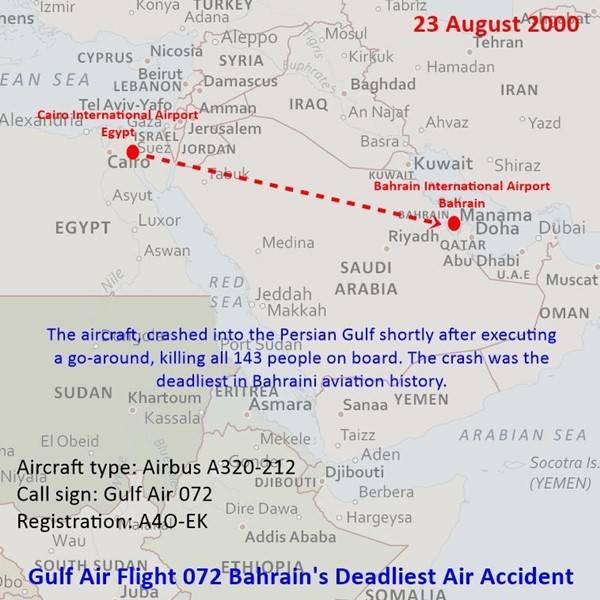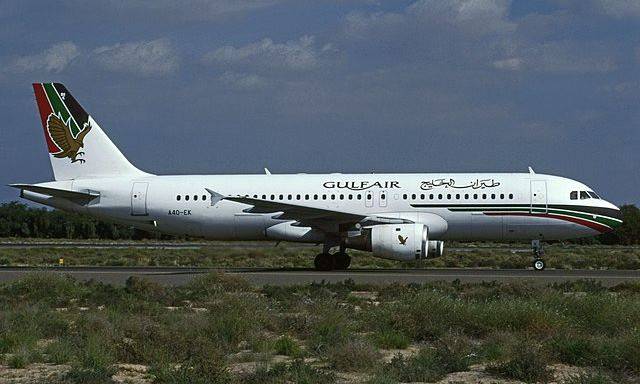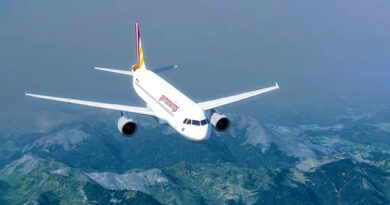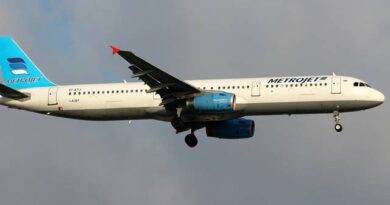Gulf Air Flight 072: Bahrain’s Deadliest Air Accident
Gulf Air Flight 072 was a scheduled international passenger flight from Cairo International Airport in Egypt to Bahrain International Airport in Bahrain, operated by Gulf Air. On August 23, 2000, the aircraft, an Airbus A320, crashed into the Persian Gulf shortly after executing a go-around, killing all 143 people on board. The crash was the deadliest in Bahraini aviation history.
The brief story of the accident: After attempting to land on Runway 12 but failing, the Airbus A320 crashed a few minutes later after performing a go-around. During the go-around, the aircraft crew experienced spatial disorientation and crashed into the Persian Gulf’s shallow seas two kilometers from the airport.

The Accident was Caused by a Combination of Factors, Including:
Pilot error: The captain of the flight, Captain Ihsan Shakeeb, made a number of errors during the approach and go-around. Errors was flying the aircraft at a high speed and failing to maintain a stable attitude.
Spatial disorientation: Captain Ihsan Shakeeb and the first officer, Khalaf al-Alawi, both suffered from spatial disorientation during the go-around. It is a common phenomenon for pilots who are flying in darkness or low visibility conditions.
Lack of training: Captain Ihsan Shakeeb and FO Al Alawi were not adequately trained to deal with spatial disorientation.
The accident investigation also found that Gulf Air had a number of safety shortcomings. These safety shortcomings was inadequate training and fatigue management programs.
In the aftermath of the crash, Gulf Air implemented a number of safety improvements, including:
Improved training for pilots: Gulf Air pilots now receive more training on spatial disorientation and other safety-related topics.
Fatigue management programs: Gulf Air now has fatigue management programs in place to help ensure that pilots are well-rested before flying.
Enhanced safety procedures: Gulf Air has also implemented a number of enhanced safety procedures, such as requiring pilots to use all available resources to maintain spatial awareness during night and low-visibility conditions.
The crash of Gulf Air Flight 072 on August 23, 2000, stands as a poignant reminder of the critical importance of aviation safety. The devastating loss of 143 lives highlighted severe shortcomings in pilot adherence to standard procedures and the risks posed by spatial disorientation. In the aftermath, Gulf Air implemented sweeping safety reforms, including enhanced pilot training, strict enforcement of standard operating procedures, and comprehensive fatigue management programs. These changes not only addressed the immediate causes of the crash but also fostered a culture of continuous safety improvement within the airline. Regulatory oversight was strengthened, ensuring that such lapses in compliance would be swiftly identified and corrected. The legacy of Flight 072 is thus twofold: a deep mourning for the lives lost and a resolute commitment to preventing similar tragedies through rigorous safety enhancements.
References and Further Reading:
Gulf Air Flight 072 – Wikipedia: https://en.wikipedia.org/wiki/Gulf_Air_Flight_072
Accident report by the Bureau d’Enquêtes et d’Analyses pour la sécurité de l’aviation civile: https://bea.aero/docspa/2000/a40-ek000823a/htm/a40-ek000823a.html
The Fatal Illusion: Gulf Air Flight 072’s Unforgettable Tragedy: https://www.youtube.com/watch?v=gEPPUDqHkqU
Image source: By Reinhard Zinabold – https://www.flickr.com/photos/steelhead2010/27557272274/, CC BY-SA 2.0, https://commons.wikimedia.org/w/index.php?curid=110889880



